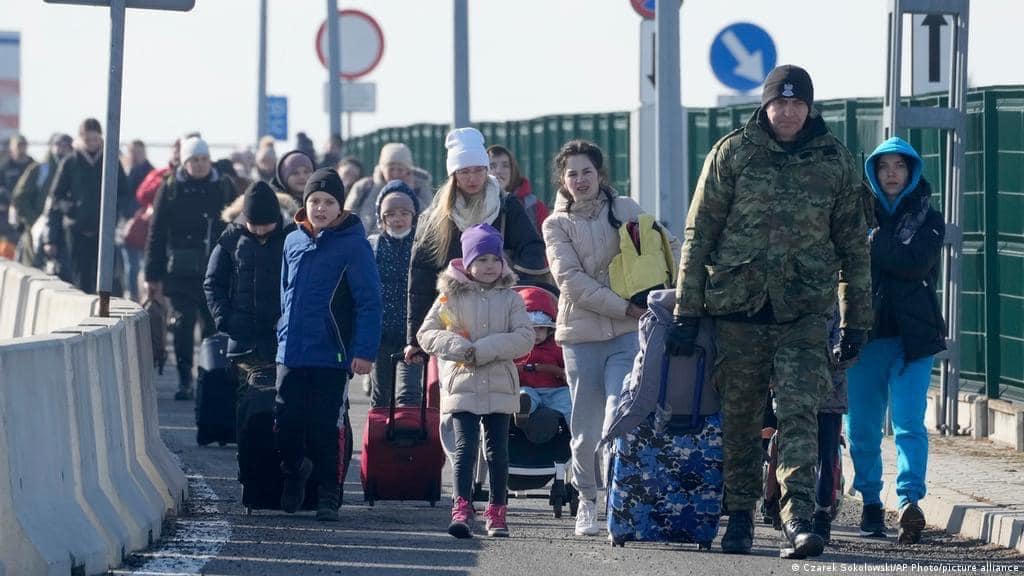
Ukrainian Refugees: Europe Grapples with accepting 3.5 million Ukrainian refugees
Source: Dalton, Matthew. (2022, March 22nd) Ukrainian Refugees: Europe Grapples with accepting 3.5 million Ukrainian refugees. The Wall Street Journal.

The war in Ukraine has displaced millions of Ukrainians from their homes, forcing them to seek refuge in nearby European countries. Poland is now overwhelmed with 2.1 million Ukrainian refugees and hopes that other European countries are able to quickly take in millions of refugees to help share the burden. The EU guarantees that Ukrainian refugees can stay in an EU country and work for at least a year, a law that comes from the time of the Balkan Wars, which has never had to be enacted until now. The EU is seemingly welcoming Ukrainians with open arms, as they are trying to enact policies to further support refugees by budgeting to pay for their medical expenses and schooling for their children. Additionally, transportation companies are providing free tickets for refugees from Ukraine to other European countries. During the Syrian refugee crisis, many European countries were not so welcoming to refugees and had enacted policies to stop refugees from coming across their borders.
Poland cannot meet the demand of Ukrainians currently seeking refuge in their country and needs help from other countries to welcome the wave of refugees. The EU is struggling with sharing the burden of refugees evenly amongst member states, and how to relocate them efficiently. Ideally, refugees would be matched into their host countries based on their ability to speak the language or have connections to their host country to make assimilation easier. European labor markets will experience a significant shock with hundreds of thousands of refugees coming in with the promise that they’ll be able to work. Therefore, speaking the native language will make it easier for refugees entering the labor market to find work. A large influx of unskilled labor will depress wages for unskilled native workers; however, native workers can adjust to this shock by moving towards more communication-based jobs where they have a comparative advantage and can earn higher wages. On the other hand, if the refugees coming in are highly skilled, or can speak the native language of their host country, they can perform more communications-based jobs. If some refugees perform more communication-based jobs, that could depress wages for high-skilled workers, or it could smooth out wage effects across for both high and low-skilled workers, depending on how the composition of labor is distributed.
4 thoughts on “Ukrainian Refugees: Europe Grapples with accepting 3.5 million Ukrainian refugees”
This is an interesting analysis of how the Ukrainian refugees are dispersing throughout the rest of Europe, with many moving to neighboring Poland. Most of the focus right now is on supporting the Ukrainian military in their fight with the Russian invaders and helping civilians escape the battlegrounds. Despite the critical nature of this support, the international community must further look to support these refugees by spreading them out within the EU. Although they may hurt some high-skilled workers if they are sent to countries where they can compete for communication-skill jobs, this negative effect would be minimal and this calculated dispersion should stand to best improve the overall economy of the countries taking in refugees to make mutually beneficial situation out of this difficult crisis.
Great post that utilizes what we have learned from class on the analysis! It is actually quite shocking for me to see how much support EU countries have provided for the Ukrainian refugees, especially in contrast to their responses to the Syrian refugees years ago. This reminds me of a debate in my middle school about the Syrian refugees crisis. At that time, one solid argument was that accepting them give chances to the terrorists to bring threats to the national security of the EU countries. And I think the reason why the EU has more sympathy for the Ukrainian refugees and treats them differently is that being their neighboring country, citizens in the EU countries know the Ukrainians better, while on the other hand, it is common for ordinary people to relate people from the Middle East to ‘violence’ and have fear of them.
I really enjoyed this article, Caroline! You did a great job of connecting the refugee crisis in Ukraine to concepts that we have learned this semester. I agree with Mike that right now most of the focus is on directly supporting the Ukrainian militarily to prevent the invasion from further escalating. I think that in the short run, Poland and other countries neighboring Ukraine will take on most of the refugee burden simply due to their accessibility. However, I hope that in the long run, countries throughout the rest of the world, not just the EU, will accept some of these refugees. As we have seen through natural experiments, such as the Mariel Boatlift, an influx of immigrants does not have significant effects on the native labor market. We have also seen that refugees provide a net benefit to their destination country, showing that countries that offer aid in this humanitarian crisis by taking in refugees will see excess returns to their services.
Caroline, this was a great post. It is great to see how much support the EU gives these Ukrainian refugees. Similarly, I know Poland hasn’t always been the friendliest to refugees, but it is great to see that they take in a fair share of the refugees from Ukraine and give them a safer space to live. It will be interesting to see whether most of the refugees going into the surrounding EU countries are low or high-skilled and what those effects will have on the wages of native workers.